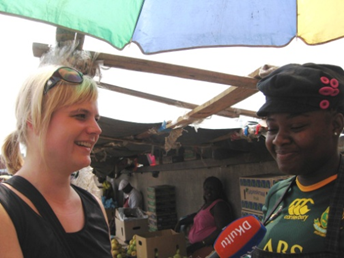Posted on April 24, 2012
After a web search, Nadine discovered that Professor Martin Breitenbach from the Department of Economics at the University of Pretoria had conducted extensive research in the field of development economics that also included research on informal traders.
Martin has, some years ago, conducted surveys within the black township communities, which shed some light on how they operate and with what kind of informal activities they earn their livelihoods. These surveys were conducted throughout South Africa and repeated in the same areas over a number of years. Martin was responsible for conducting the surveys in the Pretoria townships of Mamelodi, Atteridgeville, Soshanguve and Mabopane.
The majority of informal traders in these townships were found to be illiterate with only around 40% of the participants having completed a grade ten or higher qualification, and roughly 58% were women. By far the majority of informal enterprises were survivalist enterprises. Some of these traders supported up to five or six dependents and barely made enough to maintain a minimum level of subsistence of $2 a day for them and their dependants. In recent years, many immigrants from elsewhere in Africa, some highly skilled, were using informal trading as a springboard to employment in the formal economy, while they awaited legal residence.
During the interview, Martin emphasised the difficulty of measuring the size of the informal economy accurately, referring to the recent controversial debate between StatsSA and Adcorp as an example of how widely estimates may vary. He also pointed to the global rise in unemployment and the increasing contribution of the informal sector as an employer in South Africa and elsewhere in the world. Martin emphasised that informal traders only represent a small share of total informal economic activity by value, stating that some informal enterprises could reach turnovers of R1 million or more and sometimes include quite sophisticated manufacturing technology.
Asked about the size of the informal sector in South Africa, Martin said that estimates of employment in the informal economy varies between 25% and 30% of total employment, whereas the informal economy’s estimated contribution to total income in the South African economy varies between 10% and 12% .
The report was broadcast in two parts, Part I broadcast on 28 February 2012 and Part II on 20 April 2012. To listen to the broadcast of the interview (Part I), click here.

Left in the picture is Nadine Lindner, interviewing an informal trader
Copyright © University of Pretoria 2025. All rights reserved.
Get Social With Us
Download the UP Mobile App